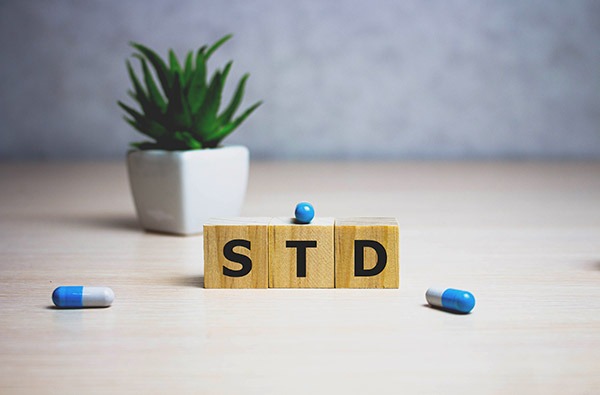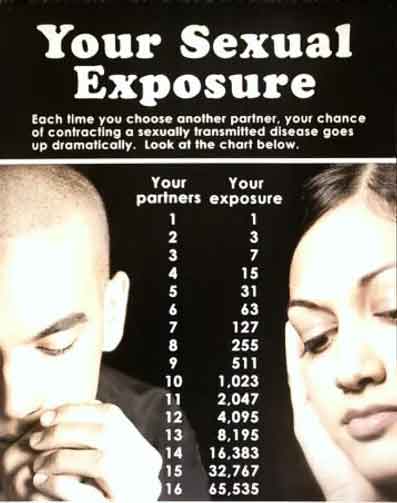STD/STI
Sexually Transmitted Diseases/Sexually Transmitted Infections (STD/STI)
He said he is clean. He promised he “never” does this. It was my first time.
We provide STD/STI testing as a part of our full service medical verification of pregnancy.

Also, just because it was your first time doesn’t mean it was your partner’s even if your partner says it was his or her first time. How can you be sure? Every person you have sexual contact with exposes you to their sexual past and the sexual pasts of everyone they’ve been with. According to the medical website Zava, if you have had 3 partners and your partner had 3 partners, you have been indirectly exposed to 1,092 people and their possible STD/STIs. Scary isn’t it? The more sexual partners you have, the more exposure you have. It’s just that simple.

Look, a lot of people are afraid to talk about STD/STIs because they could be embarrassed or ashamed. But, here at Bridges, we see all different kinds of women in different circumstances. We are all so much more alike than we are different. Unless you are abstinent (not engaging in any sexual behavior) you are susceptible to infection. We don’t judge, we just want to help you become educated about your body. Contact us to schedule an appointment to meet with one of our licensed medical providers for your FREE STD/STI test. *Currently, we only offer STD/STI testing for pregnant women.
What are the symptoms of a STD/STI?
Depending on The STD/STI, there may be zero symptoms, subtle symptoms, or raging symptoms. That’s why it’s so important to get tested so you know your next step of action.
According to the Mayo Clinic, see below for some typical symptoms of an STD/STI. Just because you have one or more of these symptoms does NOT mean you have an infection. It is important to really make sure you are taking the best care
of your body now and for your future!
- Pain or burning sensation when urinating
- Lower abdominal pain
- Vaginal discharge in women
- Pain during sexual intercourse in women
- Heavy menstrual bleeding or bleeding between periods
- Painful bowel movements
- Anal itching
- Thick, cloudy or bloody discharge from the vagina
- Clear, white, greenish or yellowish vaginal discharge
- Strong vaginal odor
- Vaginal itching or irritation
- Fever
- Headache
- Sore throat
- Swollen lymph glands
- Rash
- Fatigue
Here are a few symptoms for men:
- Any type of discharge from the penis
- Testicular pain
- Thick, cloudy or bloody discharge from the penis
- Itching or irritation inside the penis
Want to know more? Click here to see the most common types of STD/STIs and their symptoms
Some STD/STI myths:
- “I won’t get it if we just do it orally.” FALSE!
- “As long as he pulls out, I’m okay.” FALSE!
- “I’m good if we just do it anally, not vaginally.” FALSE!
- “I’m safe with sexual contact because I don’t have any penetration and we just touch each other.” FALSE!
How Do I Get an STD/STI?
A STD/STI is transmitted sexually – that is any type of sexual contact. Sexual contact includes genital touching, vaginal, oral and anal sex. Yes! Even genital touching can spread infection. If you are heterosexual, homosexual, bisexual, have had several partners or just one – you are at risk of exposure.
How Can I protect myself from an STD/STI?
- Abstinence: The best and most effective way to protect yourself from an STD/STI and/or unwanted pregnancy is abstinence. In fact, abstinence is 100% effective 100% of the time. Some of you might be thinking that everyone has sex. But that’s simply not true. There are a lot more people practicing abstinence than you think. The Center of Disease Control found that 40% of high school students were practicing abstinence. That’s a lot!
- Use Condoms: Used correctly, a latex condom can help decrease STD/STI exposure. This does not mean it is 100% effective. You can still get pregnant or an STD/STI when using a condom. Condoms work best by protecting you from infections that are spread through genital fluids. However, you can still be exposed to other types of STD/STIs just by skin-to-skin contact. Also, you may need lubricant when using condoms. Make sure you use a water-based lubricant. These can be found at any drug store. But, if you use an oil-based lubricant like massage oil, lotion or Vaseline, it can cause the latex in the condom to break down and cause the condom to malfunction. Check out this Center of Disease Control Condom Fact Sheet on how to properly use condoms: https://www.cdc.gov/condom-use
- Stand in Your Power: Engaging in any type of sexual activity is an extremely personal choice that encompasses your body and mind. This decision can have lifelong effects that include pregnancy and STD/STIs. The most important thing is that you take care of you. Communicate your sexual past with your partner and ask them questions about theirs. If you choose to continue to engage in any sexual activity, demand to use a condom. This is your life. It is wrong to feel manipulated, pressured or coerced into engaging in sexual activity. You have the right and the power to say NO in any situation. It doesn’t matter if you’re just about to have sex right at that second – you can change your mind. You can say no at any time.
If you feel like you may be in a situation where you can’t say no or you are in fear for your safety – you may be involved in an abusive situation. Not sure? Click here to learn what abuse is, the warning signs and some resources.
Note to Parents and Mentors:
Life brings all kinds of challenges we weren’t expecting – including STD/STI and pregnancy concerns. If someone comes to you with concerns about their sexuality or sexual activities, listen and let them share. Coming to you means they trust you and they feel like you will offer them sound guidance. Make sure you listen and ask questions as to best understand their situation. Try not to shame them or sound disappointed. It takes great courage to chat with parents or adult mentors about their personal sex life and preferences. If you feel unable to help them, then give us a call. We are here to help you as well! We can suggest great resources and are happy to support you!
Sources:
- Center of Disease Control (www.cdc.gov)
- Mayo Clinic (www.mayoclinic.org)
- C.S. Mott Children’s Hospital (www.mottchildrens.org)
- American Pregnancy (americanpregnancy.org)
- University of California San Francisco Children’s Hospital (www.ucsfhealth.org)
- American Adoptions (www.americanadoptions.org)
- Today’s Parent (www.todaysparent.com)
- U.S. Department of Human Services (www.hhs.gov)
- Very Well Health (www.verywellhealth.com)
- Health Line (www.healthline.com)
- National Domestic Violence Hotline (www.thehotline.org)


